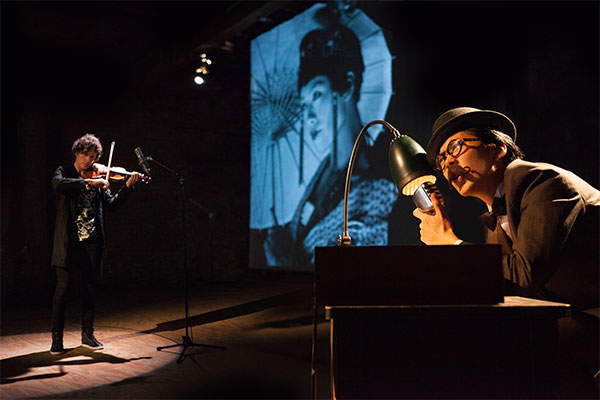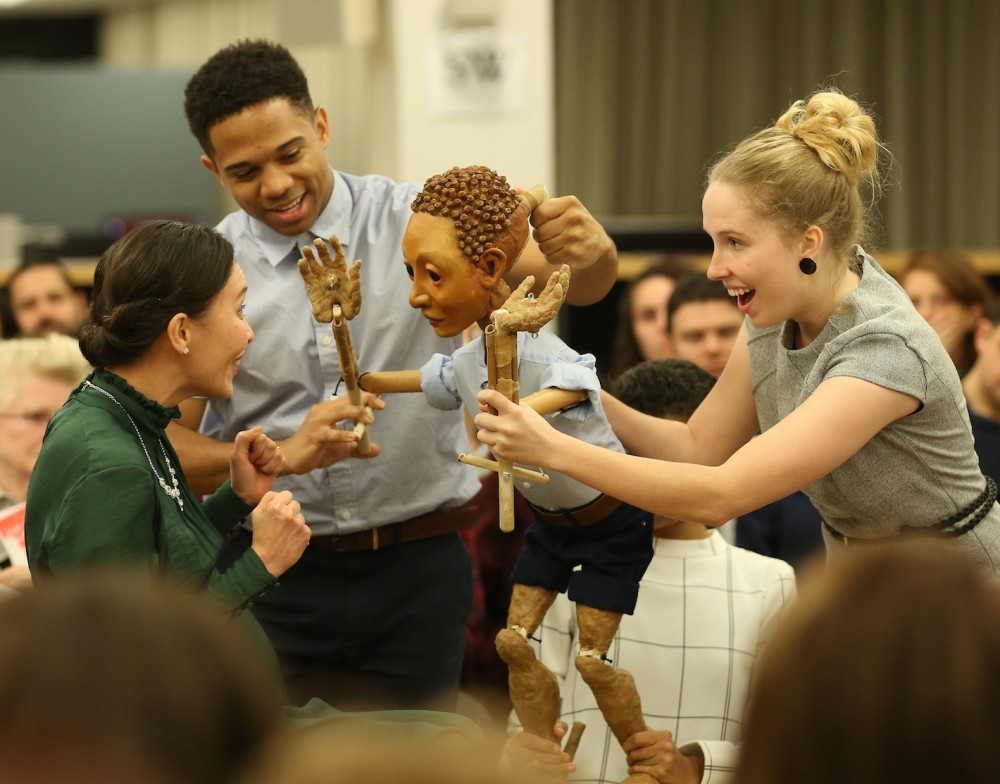by Carole Di Tosti
Saori Tsukada came to the U.S. when she was twenty-three, she tells the audience in the singular and innovative production Club Diamond which is one of the offerings included in The Public Theater’s Under the Radar Festival. The production, a work of genius conceived of by Tsukada and Nikki Appino, with exquisite violin music performed by Tim Fain, measures the multi-layered experience of the immigrant’s being and feeling “the other” in a culture that is intimately unfamiliar and isolating.
Tsukada and Appino convey the loneliness, strangeness and fearfulness of the transmigration from one country to another through an unconventional approach that incorporates film, music, unique props and costuming, with little dependence on the English language. English is only used at key moments when the creators express profound themes about American culture and society that are tragicomic.
Tsukada and Appino tell the immigrant’s story within the frame of storytelling. With great irony they convert the audience into “the other” subjecting them to an alien experience. They place the audience in 1937 Tokyo, Japan to watch an American silent film about a Japanese woman who travels to America to become a Hollywood actress.
The creators use a brilliant inversion. They make the audience feel what it is like to be “the foreigner” in a culture that one attempts to understand but cannot because they are thrown into a state of language confusion and cultural dislocation.
How do the creators effect such an empathetic transformation? The silent film synopsis is in English, but the audience watches and hears a Benshi (the amazing and chameleon-like Saori Tsukada) live-narrate film events in Japanese. Tsukada becomes the Benshi. She changes into the character before our eyes, as we simultaneously hear her voice-over narration about the 6,800 Benshi who were more influential than film stars. We see the silent film’s opening title, Club Diamond, splayed on a screen and hear the haunting, mysterious violin music of Tim Fain, which threads the production, emphasizing poignant themes of loss and isolation.
As the opening credits roll, Tsukada and Appino have created their prestidigitation. Tsukada is a Benshi in a brown suit, hat, moustache, glasses, posture, attitude. He only speaks Japanese. He vociferously editorializes and provides sound effects during the various film scenarios. The irony is that we miss all of his magnificent narration and dramatic perspective and must rely on the sparse English and cinematic storytelling cleverly crafted and beautifully accompanied by Fain’s music. Thus, we empathize because we are as perplexed as any immigrant struggling to understand the symbols, metaphors and fine nuances of an alien community.
Another irony is that the Benshi’s vibrant narration holds profound warnings and critiques about American culture that Americans could benefit from but never hear. As we follow the actress-to-be (Tsukada is ultra- feminine in the screen role which is an ironic counterpart to her portrayal as the vocal, male Benshi), who struggles to find lodging, we relate as she misinterprets cultural cues that lead her into danger, symbolized in a scene with a small, representational bird which she interprets to mean opportunity but is the opposite. Lured to Club Diamond, she becomes the puppet of the proprietor who uses her as an object of desire and has her play the “exotic” role of a geisha; it is a nightmare world.
Ten years have passed; it is the U.S. occupation of Japan. The word “Revolution” appears onscreen and the film dissolves. Tsukada as the Benshi changes into a costume that resembles cast-off, olive-green, army fatigues, a white kerchief face-covering and goggles.
Adapting to the U.S. occupation, the Benshi continues his story telling with a makeshift, portable cardboard theater atop a bicycle (an innovative prop which later transforms to an ersatz movie projector). The Benshi’s humorous attempts to adapt and sell his “wares” show grit, resilience and talent which is exhilarating and heartbreaking. And the audience finally learns what becomes of the actress who goes to America to be a star. It is a conclusion laden with irony.
Club Diamond is profound, nuanced and thematically riveting. Tsukada’s performance (on film, as the Benshi) is mesmerizing and deeply personal. Her closing remarks, her Dad’s advice about Americans (she opens and closes with his comments) echo roundly. Fain’s music is superb.
Club Diamond is part of Under the Radar Festival at The Public Theater (425 Lafayette St, NY, NY). The production runs until Monday, 9 January. Tickets: publictheater.org or call 212-967-7555
























